Reef Nutrient Champion Award
Winner – David DeFranciscis

Working collaboratively with government, industry and fellow cane farmers, David DeFranciscis has driven change on his property and within his community to achieve real results for the Great Barrier Reef and the viability of cane farm businesses in the Burdekin catchment in Queensland. David’s journey began in 2011 when he co-designed the RP20 Burdekin Nitrogen Trials (RP20) project to test an industry nutrient management standard on grower properties to reduce high nitrogen applications. David was instrumental in the success of this project and acted as a conduit between local growers and the department while participating in the trials. The project has now validated the standard in the Burdekin and has reduced the amount of nitrogen applied on 23 farms by 500 tonnes.
Reef Sediment Champion Award
Winner – Bob Harris
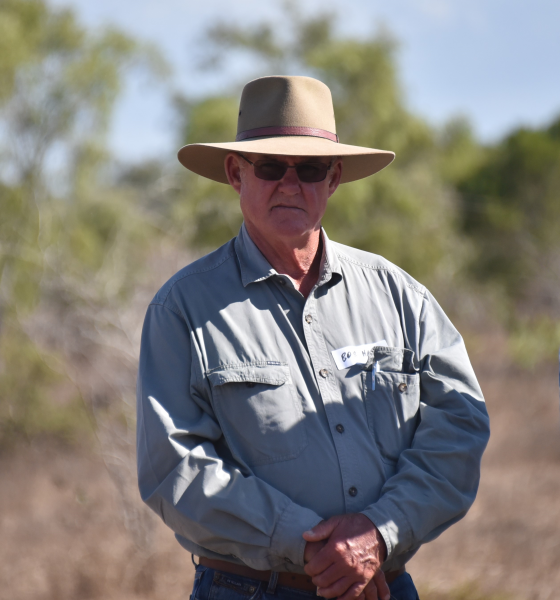
Bob Harris purchased Glencoe in 2000. The property was very susceptible to erosion and top soil loss due to poor ground cover and bare ground, through funding support from NQ Dry Tropics and Reef Catchments, a major infrastructure upgrade was planned and undertaken. Projects were undertaken to fence riparian areas and land in fragile condition. In total 37km of internal fencing and 25 watering points were installed through project support. In addition, Bob has installed 23km of land type fencing. This infrastructure has allowed better management of grazing, resulting in improved water quality outcomes and boosting farm productivity. In 2015, Bob completed a Holistic Management training course supported by NQ Dry Topics. Through the implementation of HM principals Bob has adopted a system of rotational grazing which has resulted in increased plant production, improved water infiltration and retention, less land degradation and improved lifestyle and profitability.
Reef Conservation Champion Award
Winner – Mt Pleasant Station Management

In 2000, after attending a Grazing for Profit School, the Mt Pleasant Station Management made a strategic decision to move away from a production-based business model to focus on landscape function and environmental health. This decision has resulted in enormous economic and environmental rewards through both ecological enhancement and improved productivity. The introduction of a time-controlled grazing system implementing a short graze period, adequate rest, and higher density of animals has resulted in improved soil health, pasture condition and water quality. Integral to the success of the grazing system is the understanding that adjusting stocking rate to carrying capacity is crucial and forage budgeting and monitoring must be done regularly and continually. Landscape function analysis and Grazing BMP are used as part of a process of constant re-evaluation and modification. Animals are matched to the environment, and breeding focuses on matching traits that complement the low input grazing system.
Reef Pesticide Champion Award
Winner – Phillip Deguara

Philip Deguara has been a cane farmer for over 12 years as part of the family farming enterprise. He is a fourth-generation cane grower in the Sandy Creek catchment and has a passion for learning and improving his business. Philip was one of the Sandy Creek growers responsible for implementing the grower-led water quality monitoring conducted with the Department of Environment and Science Water Quality Investigations team as part of RP144C Sandy Creek project. Philip has used his experience to inform other growers about pesticide movement. This has led to Philip applying more knockdown herbicides, use of shielded sprays and all applied with rate controllers and GPS to ensure best result possible across their 300-hectare cane property. By implementing these practices, Philip has managed to reduce the number of pesticide applications, saving time and reducing pesticides being applied on his farm.
Reef Extension Officer Champion Award
Joint Winner – Allan Blair
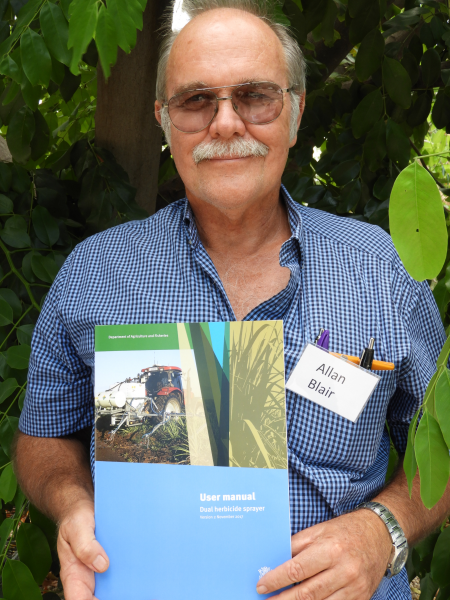
Allan Blair has spent a lifetime working with growers in the wet tropics of Queensland. As part of his work, Allan designed a sprayer that can apply two different types of herbicide at the same time. The dual herbicide sprayer applies standard herbicide mixes to the row and non-residual herbicides to the inter row reducing the potential for contaminated run off that can impact water quality in the reef catchments. In 2013 -14, three experimental dual herbicide sprayers were constructed for growers and extension officers to use and evaluate. It is estimated that over 14,000 hectares are now being sprayed using the dual herbicide sprayer. This has resulted in an estimated reduction of six tonnes of residual herbicide active constituents being applied to cane – a significant positive impact on Reef water quality.
Joint Winner – John Day

John Day’s career represents over 35 years of achievements working with landholders to enhance their land management practices. In his recent role as Senior Conservation Technical Officer with the Burnett Mary Regional Group (BMRG), John directly oversaw the remediation of over 54 sites throughout the region in construction works. Additionally, he has worked with other regional extension officers on a multitude of other sites addressing actively eroding soils, developing site design plans and overseeing onsite construction works. John has been instrumental in promoting landholders’ uptake of best practice soil conservation practices including for example: groundcover and water management; rehabilitation of actively eroding sites; gully, track and hillslope erosion and deteriorating contours bank in cropping areas. John’s work continues to contribute to immediate reductions in sediment loads impacting local waterways and the Great Barrier Reef.
Reef Community Champion Award
Winner – Mulgrave Landcare and Catchment Group
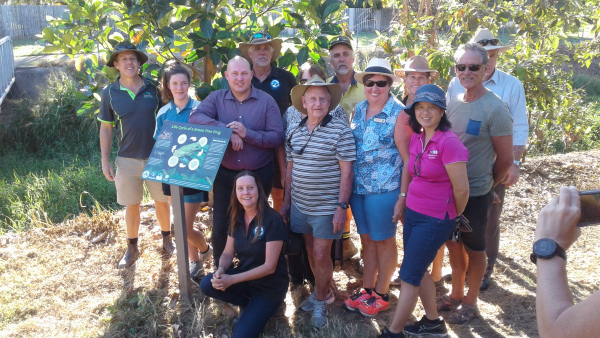
The Mulgrave Landcare and Catchment Group have achieved landscape scale change in the Mulgrave catchment with the recent conclusion of a five-year biodiversity project. 33,000 trees were planted, much of which was riparian revegetation which helps prevent streambank erosion and blocks nutrients and sediments from entering the water column. Over the life of the project the group held 31 community planting events and were assisted by hundreds of volunteers and 21 landholders to plant over 17 hectares. The group are also involved in the restoration of a wetland site adjacent to Fig Tree Lagoon near Fishery Falls. It’s believed the site has the potential to provide habitat value and improve water quality through not only the wetland restoration but the installation of a water quality treatment train, including a subsurface bioreactor. Other upcoming landcare projects continue to focus on creek bank repair and revegetation in the lower Mulgrave catchment.
Reef Youth Champion Award
Joint Winner – Nicole Nash
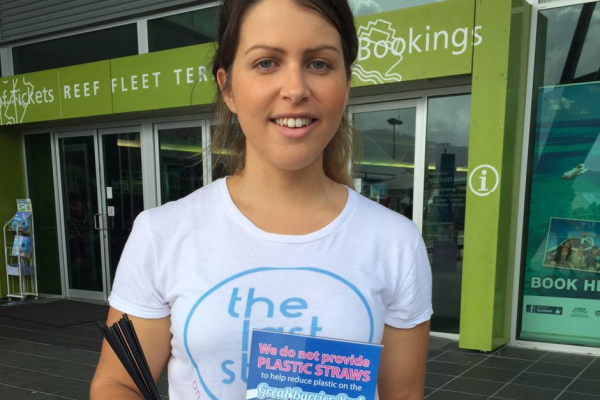
After watching thousands of people use single-use plastics everyday as a marine biologist working on various reefs around the world, Nicole Nash launched The Last Straw on the GBR campaign. Through a partnership with Wet Tropics Healthy Waterways and Terrain Natural Resource Management group in Cairns, Nicole has taken action to raise awareness that 80% of marine debris actually enters the ocean from a land-based source and encouraged venues within a 200km radius of the QLD coast to go plastic straw free. Over 320 venues across the Reef catchments using an estimated 4.1 million straws per year have now gone plastic straw free, including the Cairns Regional Council, in an effort to reduce waste and plastic pollution in the Great Barrier Reef while improving water quality.
Joint Winner – Gavin Rodman

Gavin Rodman grew up on a sugarcane farm in Deeral and is well known and respected by the local farming community. He has worked for Sugar Research Australia (SRA) as an Adoption Officer for over three years, based at both Tully and Meringa in the Wet Tropics. In that time, he has engaged directly with industry to make a tangible impact to environmental sustainability and agricultural productivity. He has been an integral part of the design and delivery of the Cane to Creek project and supported the rollout of Best Management Practice training in the Wet Tropics as the lead deliverer of SIX EASY STEPS training across the cane industry. The training is a science-based nutrient management tool that enables the adoption of best practice nutrient management on-farm. Gavin in currently developing a SIX EASY STEPS toolbox for the industry and guidelines for the Rocky Point district.
Reef Youth Champion Award – Under 15
Winner – Sid Crawshaw
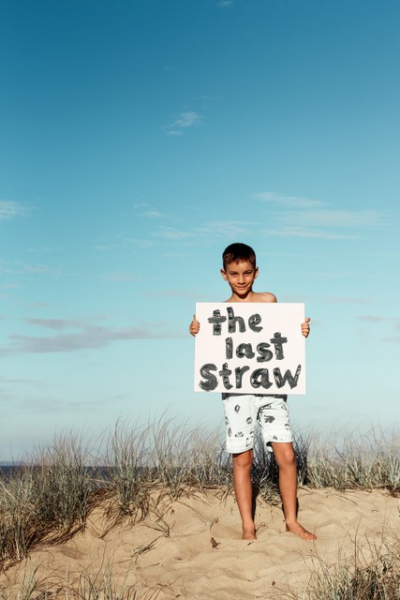
Ten-year-old Sid Crawshaw is significantly improving the quality of water that flows to the Great Barrier Reef by reducing the use of single-use plastic straws in his coastal home-town of Tannum Sands. Sid has encouraged his fellow school students and family members to say ‘no’ to straws and three local business owners challenged themselves to make a change either completely removing or swapping to paper straws, including the Boyne Island McDonalds. Sid has created a tidal-wave of change and has stopped an estimated 8,000 single-use plastic straws from entering landfill or the Great Barrier Reef. However, Sid’s work is not done. Broadening his focus to include all plastics, Sid is currently in working with the Gladstone Regional Council to explore how they can work together for the betterment of the reef.
The Prince of Wales Environmental Leadership Reef Sustainability Award
Winner – Gerry Deguara

Gerry Deguara is a second-generation farmer located in the North Eton in Central Queensland. Gerry and his family farm approximately 800 hectares growing mostly sugar cane but also several pulse crops. He has and continues to be a leading figure in promoting stronger natural resource management within the Australian sugar industry. For Gerry, the journey of improving the sustainability of his large farming operation all started with major changes to water infrastructure and the successful use of centre pivots for irrigation. He has converted farm and harvesting equipment to a two metre controlled traffic farming system maximising the growing area of his paddocks, reduce fossil fuel use, improve yields, improve soil health and reduce the volumes of chemical and nutrient run-off in water leaving the farm. Gerry has a strong focus on using sugar mill bi-products with mill mud and a Bio-Dunder, mixed with urea to now provide the vast majority of the farm nutrient requirements. He has also adopted green cane harvesting thereby eliminating the need for cane burning operations. Gerry freely gives his time to show and explain the many changes in his farming operation and has hosted visits from farmers and Australian and international delegates.
Runner up – Frank Mugica

Frank Mugica has farmed in the Burdekin for twenty-five years. He first learnt about the effects of his management practices by testing cane runoff from his cane and grazing property in Dalbeg. He has since installed a recycle pit, shielded sprayer, and spray controller, all improving efficiency and reducing environmental impact. In 2014, Frank trialled banded mill mud on his current 120-hectare farm in Brandon and now practices this farm-wide. He joined another project supporting growers adjacent to wetlands to trial nutrient and irrigation efficiencies and has reduced his nitrogen use by 20kg per hectare. Recently, he adapted machinery for strip tillage for green cane trash blanketing. By 2022, Frank plans to be a fully accredited Smartcane BMP farmer. To encourage wildlife, Frank began revegetating the farm perimeter, planting 100 native trees in 2017. He continues planting and weeding for habitat, shade and erosion control. As an “outdoor classroom”, it also helps his daughters, Alaya and Ellyana, to understand biodiversity, pest control, and the balance between agriculture and nature. Frank has embraced every opportunity to better manage nutrient use, improve irrigation efficiency and raise awareness of important environmental issues, both locally and among the wider farming community.













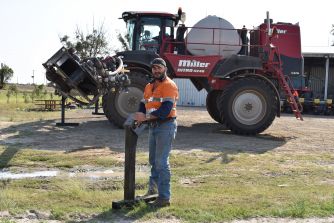
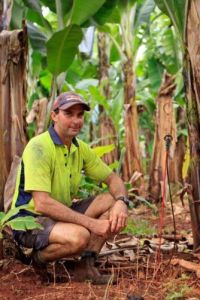 Runner Up – David Rolfe, banana grower from Mena Creek
Runner Up – David Rolfe, banana grower from Mena Creek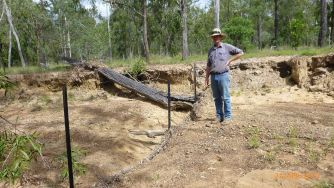 Winner – Dan Bishop, grazing landholder from the Fitzroy region
Winner – Dan Bishop, grazing landholder from the Fitzroy region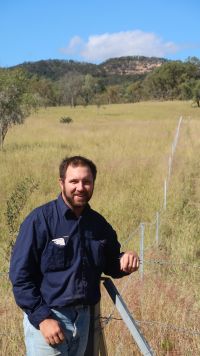 Runner Up – Louis Moore, grazing landholder from the Fitzroy region
Runner Up – Louis Moore, grazing landholder from the Fitzroy region Winner – Gary and Angela Spotswood, cane growers from the North Queensland Dry Tropics region
Winner – Gary and Angela Spotswood, cane growers from the North Queensland Dry Tropics region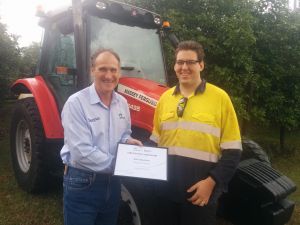 Runner Up – Joshua Maunder, landholder from the Wet Tropics region
Runner Up – Joshua Maunder, landholder from the Wet Tropics region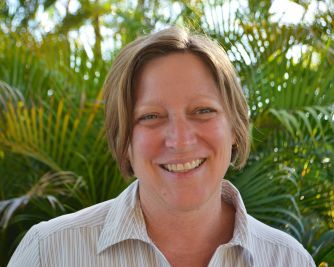 Winner – Debra Telford, Extension Officer for CANEGROWERS Innisfail from the Wet Tropics region
Winner – Debra Telford, Extension Officer for CANEGROWERS Innisfail from the Wet Tropics region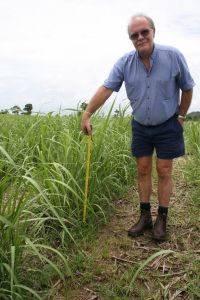 Runner Up – Allan Blair, Extension Officer for Queensland Government Department of Agriculture and Fisheries
Runner Up – Allan Blair, Extension Officer for Queensland Government Department of Agriculture and Fisheries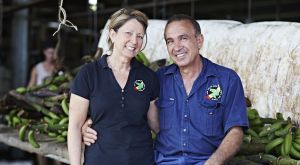 Winner – Frank and Dianne Sciacca, banana farmers from the Wet Tropics region
Winner – Frank and Dianne Sciacca, banana farmers from the Wet Tropics region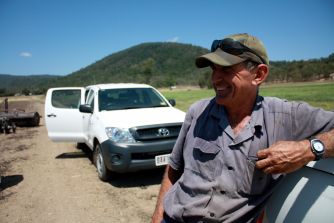 Runner Up – Tony Bugeja, cane farmer from the Mackay region
Runner Up – Tony Bugeja, cane farmer from the Mackay region